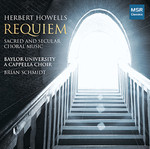|
Back
08/13/2021
“Sacred and Secular Choral Music”
Enrico Miaroma: Light ^
Alexander L’Estrange: Oculi omnium
Zdeněk Lukás: Dies irae
Felix Mendelssohn: Richte mich, Gott, Op. 78 n° 2
Wolfram Buchenberg: Erbarme dich unser [1]
Herbert Howells: Requiem [2]
Jake Runestad: I will lift mine eyes
Tomás Luis de Victoria: O vos omnes
Traditional (arr. M. Wilberg and N. Short): The Dying Soldier [3]
Susan Labarr: I hear thy voice ^
Emily Wolfe [1, 2], Hannah Becker, Rachel McCormick, Jenny Skarke [2] (soprano), Maura Brown, Gabby Kreuger [2] (alto), Austin Rabon, Eric Mejia, Kameron Alston, Matthew Newhouse [2] (tenor), Austin Ingalls [2], Andrew Eaton [3] (baritone), Baylor University A Cappella Choir, Brian Schmidt (conductor)
Recording: Armstrong Browning Library, Baylor University, Waco, Texas (April 6 -7, 2018 and March 22-23, 2019) (^ World Premiere Recording) – 52’53
MSR Classics MS 1757 – Booklet in English

   
The cover proclaims Herbert Howells’ Requiem as the focus of a new album by Baylor University’s A Cappella Choir, but there is so much more packed into this collection of elegantly sung musical selections from throughout the ages.
The tone is reflective, appropriate to the times in which we live, yet the music is enlivening, uplifting, even celebratory under the direction of Brian Schmidt. The musicianship of the group, which I estimate hovers close to 50 singers at times, is quite extraordinary when one considers these are university students still gaining experience on the concert stage.
The six movements of Howells’ Requiem appear about halfway through the recording. Remembered primarily today as a composer of Anglican sacred music, Howells composed this work in the years 1932-33. It was not published and performed until nearly 50 years later. The work has a familiar format (Scriptural passages alternating with devotional Psalms). Even if not accustomed to this setting, listeners with choral backgrounds may find themselves singing along to the familiar texts of Psalms 23 and 121 (“I will lift up mine eyes unto the hills...”), buoyed by the choir and excellent soloists. It is heartening to see a renewed interest in the abundant compositions of this composer, who was knighted during his lifetime and inurned in Westminster Abbey.
Of equal interest are some of the other selections on the album, including two World Premiere Recordings: Enrico Miaroma’s Light, set to a text by Tagore, which opens the album, and Susan Labarr’s lullaby, I hear thy voice, to text by Eugene Field (a 19th century author of children’s poetry), which provides a lyrical conclusion.
Another contemporary perspective is offered by Alexander L’Estrange’s Oculi omnium, a motet on Psalm 145:15, “The eyes of all wait upon thee...,” with shimmering veils of discord that dissolve into phrases with an occasionally Hildegardian turn.
A more challenging approach comes in Zdeněk Lukás’ Dies irae, an agitated, exciting riff on the Day of Judgment theme, while Wolfram Buchenberg’s Erbarme dich unser ("Have mercy upon us") develops with relentless drive. Soprano Emily Wolfe solos in the latter work with radiant clarity and deep engagement with the text. The entire choir delivers a powerful, gripping presentation in this urgent plea.
Later in the album, Andrew Eaton, baritone, offers a heartbreaking traditional song from the American Civil War era, The Dying Soldier, in a modern arrangement by Nigel Short and Mack Wilberg. A touch of New Age sonority makes Jake Runestad’s version of Psalm 121 different from the Howells’ version, but no less delightful.
Yet, not everything is 20th and 21st century in this album of varied moods and humors. Felix Mendelssohn’s Richte mich, Gott, from Psalm 43 (“Judge me, o God...”) receives a nuanced interpretation, while the chorus shines in O vos omnes (text: Lamentations 1:12) by Tomás Luis de Victoria (1548-1611), one of the giants of the Counter-reformation.
All in all, despite a somber theme, this is a wonderful album. Perhaps the biggest takeaway is to rethink Herbert Howells, disassociate him for a bit from the religious organization he served, and evaluate him objectively as the composer of music of striking intelligence and exquisite beauty.
Linda Holt
|